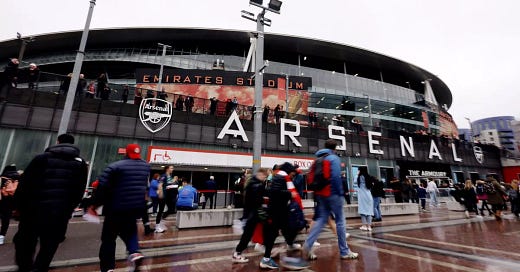The Changing Landscape of Premier League Ticketing Creates More Challenges for Fans
Rise of ticket prices scenario presents a paradox where clubs are fighting to ensure tickets reach genuine fans but their own pricing strategies are pushing out the same fans they aim to protect.
Haven't subscribed yet? Join our community of sports enthusiasts eager to broaden their understanding of global sports. Whether you're a student, professional, or business owner, our newsletter provides invaluable insights into the sports industry.
Arsenal and Liverpool have recently taken stringent measures against ticket touting, banning thousands of accounts involved in unauthorised sales. Arsenal alone has cancelled over 26,000 accounts linked to suspicious activity, while Liverpool shut down nearly 100,000 fake ticketing accounts last year. While these actions safeguard genuine fans from scams, they also highlight the immense demand for tickets and the underlying scarcity problem that clubs have yet to solve effectively.
Arsenal’s decision to increase ticket prices for the 2025/26 season has drawn criticism, especially as other clubs like Liverpool, West Ham, and Brentford have opted for price freezes. Arsenal’s justification lies in increasing operational costs and the need to remain competitive. However, this rise of 3% for the upper tier and 5% for the lower tier does exacerbate the financial burden on fans, many of whom are already struggling with the cost-of-living crisis.
In an attempt to offer more flexibility, the Gunners have introduced a 19-match season ticket, covering only Premier League games. While it appears to provide relief by reducing upfront costs, it ultimately does not offer substantial savings. This move, though marketed as a fan-friendly initiative, can be seen as a strategic way to segment pricing and extract more revenue.
One of the most contentious issues surrounding ticket pricing is its impact on the club’s core supporters. Long-time fans, who have been attending games for decades, now find it increasingly difficult to afford matchday experiences. Meanwhile, affluent tourists and casual spectators, often willing to pay premium prices, find it easier to secure tickets.
Check out my previous blog on the similar topic:
The Rising Problem of Premier League Ticket Prices
Haven't subscribed yet? Join our community of sports enthusiasts eager to broaden their understanding of global sports. Whether you're a student, professional, or business owner, our newsletter provides invaluable insights into the sports industry.
Moreover, Liverpool has also taken firm steps against ticketing fraud, issuing lifetime bans and suspending thousands of accounts involved in unauthorised resales. However, unlike Arsenal, Liverpool has committed to a price freeze for the upcoming season. This demonstrates a balance between financial sustainability and fan consideration, something Arsenal’s approach lacks.
While both the clubs are currently in the spotlight, ticketing issues persist across the Premier League. Manchester United, Chelsea, and Tottenham have all faced similar challenges, dealing with high demand, ticket resales, and pricing controversies. Clubs are increasingly introducing ballot systems and digital verification methods to curb illicit sales, but none have fully addressed the affordability concerns.
Football clubs today operate as global brands, and revenue generation is a priority. Ticket sales are just one aspect of their financial ecosystem, alongside broadcasting deals, sponsorships, and merchandise sales. However, there is an inherent conflict between treating clubs as businesses and maintaining the cultural and community-driven essence of football. Striking this balance is crucial, yet many clubs are tilting towards the commercial side at the expense of local fanbases.
Overall, with rising operational costs, the trend of ticket price increases is unlikely to slow down. To me, this risks alienating traditional fans, potentially leading to a future where stadiums cater more to wealthier spectators and corporate guests rather than lifelong supporters. If unchecked, this could erode the very identity of club football, diminishing the unique atmosphere that makes Premier League matches so special.
But are there any ways that could help mitigate the situation? Well, there are a few things that come right to the top of my mind like – clubs could introduce progressive pricing models based on fan loyalty, rewarding long-term season ticket holders with price freezes or discounts. Expanding concession schemes for younger and lower-income fans, similar to Borussia Dortmund’s affordable standing tickets, could ensure accessibility.
More importantly, they could also implement a regulated secondary marketplace, where unused tickets can only be resold at face value, which would prevent third-party exploitation. Government intervention could also help by enforcing stricter anti-touting regulations, similar to laws in Spain. Subscription-based ticketing models, where fans pay a monthly fee for match access, could ease financial pressure while ensuring consistent stadium attendance.
Eventually, all football clubs will have to remember that their most valuable asset isn’t their global branding but their loyal supporters. While financial sustainability is essential, it should not come at the cost of pricing out the very fans who create the vibrant matchday atmosphere. A more inclusive and thoughtful ticketing strategy, combining commercial viability with fan accessibility, is the only way forward to ensure football remains the people’s game.
Some housekeeping stuff
If you can’t find the newsletter, check your Spam folder or Promotions tab, and move this email to your primary inbox. Make sure to mark this email address as ‘not spam’.
Today’s recommended podcast…
Only one of the 17 surviving Premier League clubs from last season hasn’t increased their ticket prices – and some of those clubs have hiked prices or even completely binned concession tickets for children.
The hosts of the podcast tackle one of the most burning issues in the Premier League right now. Plus, what’s the biggest false dawn in football? Would it be better if transfers were just revealed on matchday?






